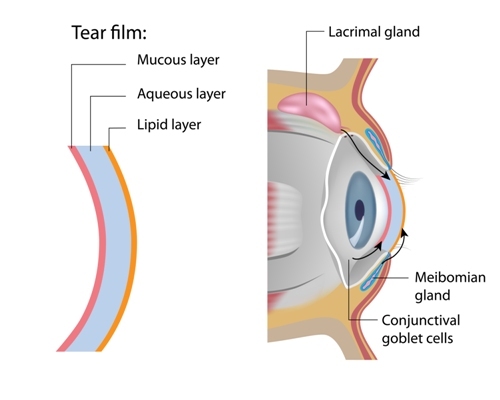Do Dry Eyes Affect Cataract Surgery?
Do you have dry eyes and need cataract surgery? Dry eyes can reduce the accuracy of your cataract procedure and make for a more difficult recovery. But if you have dry eyes, this doesn’t mean you can’t have cataract surgery.
Your ophthalmologist will take steps to treat your dry eyes before removing your cataracts. Effectively treating your dry eyes can improve the outcome of your cataract procedure.
Keep reading to learn more about dry eyes and cataracts, how dry eyes impact cataract surgery, and treatment options for dry eyes.
What is Dry Eye?

Dry eyes occur when your eyes create poor-quality tears that evaporate too fast or produce insufficient tears. Dry eyes can be caused by different factors that interfere with a healthy tear film.
Your tear film consists of three layers: the oily layer, the watery layer, and the mucus layer. All three ensure the surface of your eyes is healthy, clear, lubricated, and smooth.
A problem with any of these layers can result in dry eyes and uncomfortable symptoms.
Symptoms of Dry Eyes
The first and most obvious sign is dry eyes. Other symptoms include:
- Blurred vision
- Redness
- Eye fatigue
- Watery eyes
- Double vision
- Sensitivity to light
- Scratchy or gritty feeling
- Burning or stinging sensation
- Difficulty wearing contact lenses
- Stringy mucus around or in your eyes
If you experience these symptoms, let your ophthalmologist know. These are not exclusive to dry eyes and may indicate another eye condition. If you have dry eyes, your ophthalmologist can determine appropriate next steps.
Cataracts
A cataract occurs when the natural lens of the eye becomes cloudy. This happens when proteins in your eye break down and build up on your lens.
Often, cataracts develop gradually, so you might not notice any symptoms for many years. But over time, you may experience the following symptoms:
- Blurred or cloudy vision
- Halos and glare
- Poor night vision
- Sensitivity to light
- Double vision in one eye
- Colors appearing dull or faded
- Need for brighter lighting for close-up activities like reading
When these symptoms interfere with your everyday life, your ophthalmologist will recommend cataract surgery.
Dry Eyes and Cataracts

It’s not unusual to have dry eyes and cataracts simultaneously. The most significant risk factor for these two conditions is age.
But while cataracts and dry eyes can coexist, one can’t cause the other.
How Do Dry Eyes Impact Cataract Surgery?
Dry eyes can affect cataract surgery in several ways. These include:
Inaccuracies in IOL Power Calculations
Before your cataract procedure, Dr. Tokuhara at Desert Vision Center will measure your eye to determine the best-focusing power for your intraocular lens (IOL). An IOL is an artificial lens that replaces your natural, cloudy lens.
If the surface of your eyes is dry or your tear film is uneven, there are likely to be errors in the calculations. Due to these inaccuracies, you can have residual astigmatism, nearsightedness, farsightedness, or presbyopia after cataract surgery.
As a result, you may end up with an increased dependence on glasses after cataract surgery.

Poor Vision Quality
Dry eyes can affect the outcome of cataract surgery. It can compromise the quality of your vision after the procedure.
Because of this, you might not see as clearly as you would if you didn’t have dry eyes.
Dry Eyes Can Worsen After Surgery
During cataract surgery, an incision is created through the cornea to reach your natural lens and remove your cataract. The incision can disrupt the balance of your tear film, worsening your dry eye symptoms after cataract surgery.
Benefits of Dry Eye Treatment Before Cataract Surgery
If you’re diagnosed with dry eye syndrome, your ophthalmologist will want to ensure it’s under control before removing your cataract.
Dry eye treatment before cataract surgery can:
- Ensure you get the best IOL for your vision needs and lifestyle
- Help you achieve clearer, sharper vision after cataract surgery
- Dramatically decreases the risk of infection
- Prevent the procedure from exacerbating your dry eyes
Dry Eye Treatment
There are various dry eye treatment options available at Desert Vision Center. Depending on the cause and severity of your dry eye, your eye doctor may provide the following treatment options:
Medications
We offer traditional treatments like artificial tears, punctal plugs, and medications. Medications prescribed may include Restasis, Cequa, or Xiidra to help increase the production of tears and reduce inflammation due to dry eye.
BlephEx
BlephEx is a painless in-office procedure using a medical-grade micro sponge that exfoliates and removes debris and biofilm from the surface of your eyelid margin and meibomian glands.
LipiFlow
LipiFlow is an in-office procedure to help clear blocked meibomian glands, which can lead to dry eye symptoms. Most patients see results after 6-8 weeks and continue to experience relief from their symptoms for 12-36 months after the procedure.
IPL
IPL is a treatment that targets inflammation and helps to reduce chronic blockage of the meibomian glands, helping them function as they should and making the tear film healthier. Patients usually undergo IPL in 3-4 monthly sessions and may require retreatment if necessary.
Amniotic Membrane
Patients with severe dry eye syndrome may benefit from biologic therapies like amniotic membrane graft therapy. Amniotic membranes treat severe dry eye, where a chronic lack of tears has led to corneal damage.
The membranes have antimicrobial and anti-inflammatory properties and help repair the eye’s surface.
Ensure the Success of Your Cataract Procedure
Dr. Tokuhara from Desert Vision Center offers the most effective treatments for dry eye to ensure the success of your cataract procedure while reducing the risk of possible complications. Do you have dry eyes and cataracts?
Schedule your cataract consultation at Desert Vision Center in Rancho Mirage, CA, to learn more!

